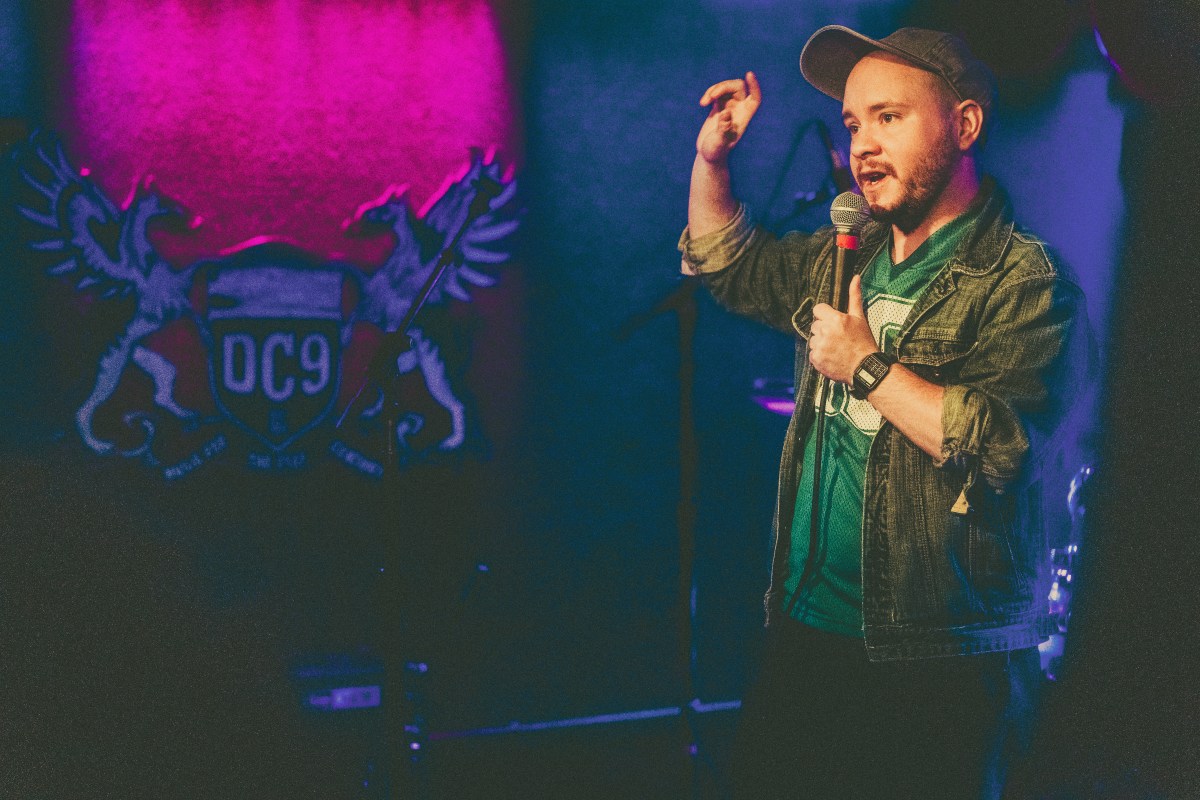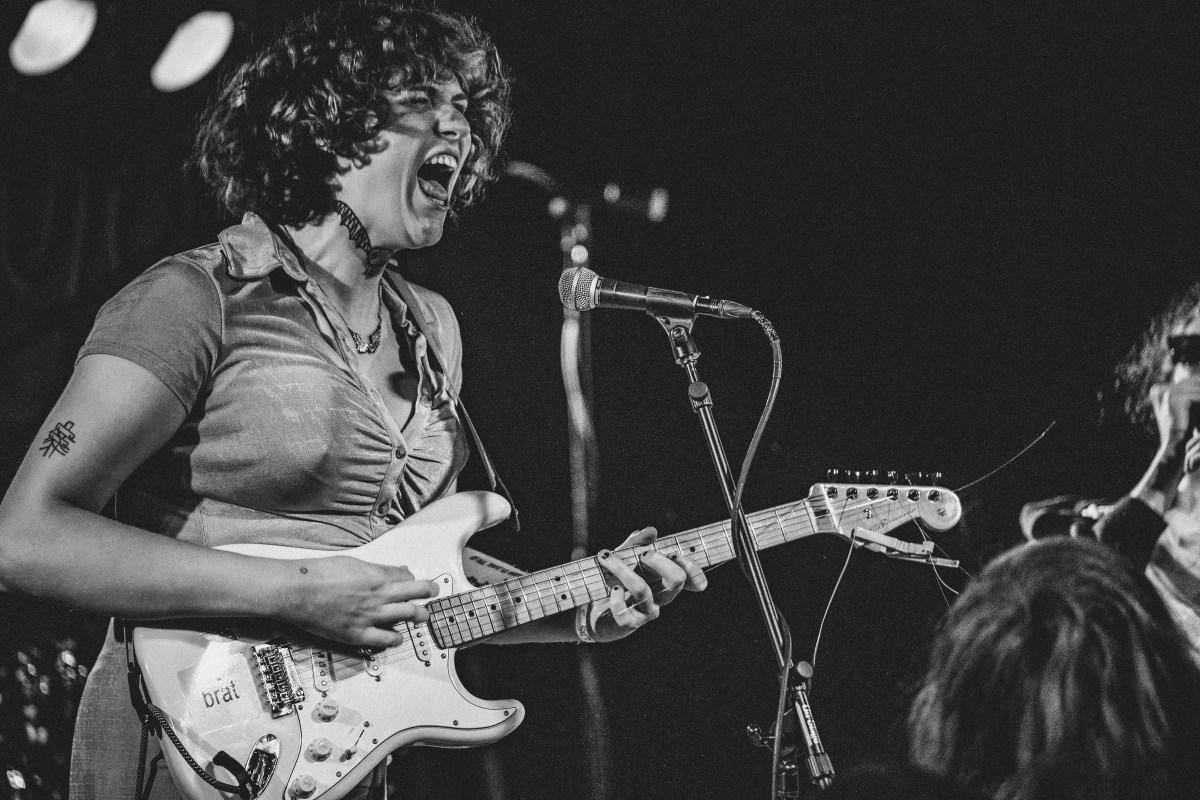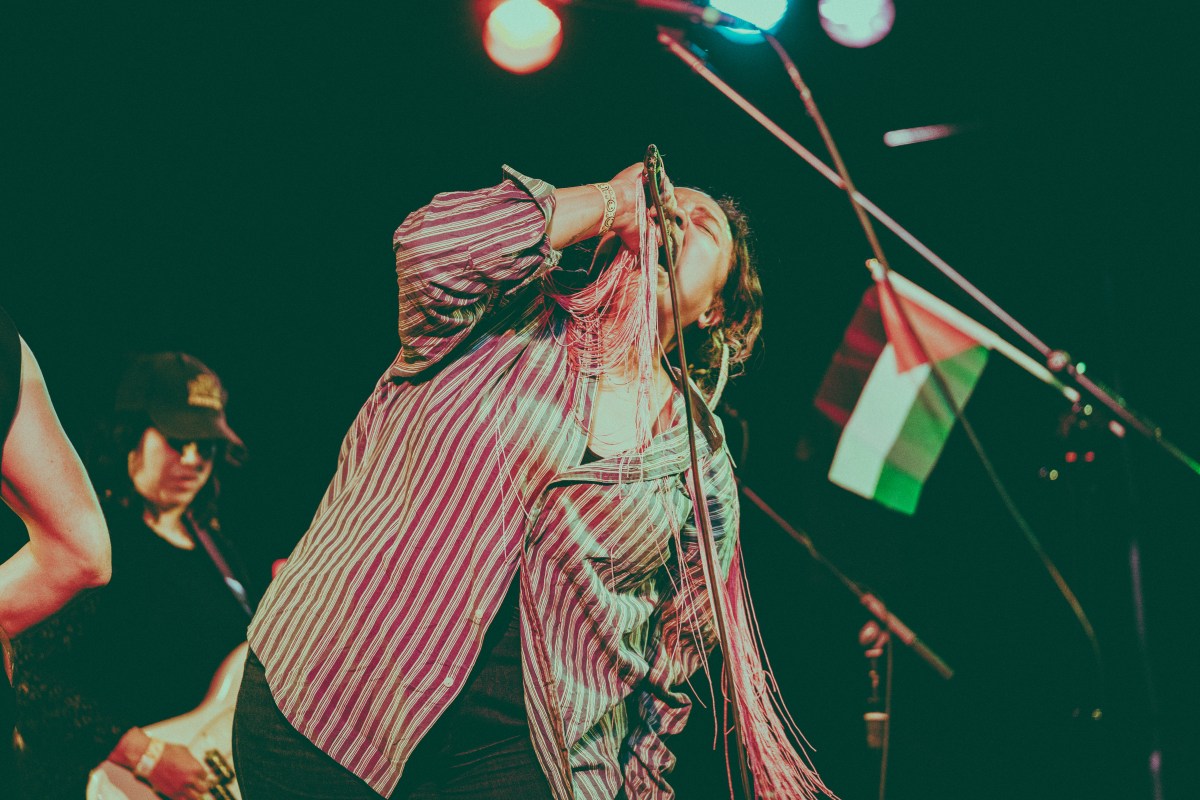It’s after midnight on a Friday night on the second floor of a divey DC nightclub. The band onstage, a trans indie-pop duo, backlit in blue and deep magenta, has captivated a nearly all-trans crowd. A disco ball rotates above the stage, its mirrored faces sliding fleeting squares of light across the room. The crowd is deeply present, letting the music flow through their individual and collective beings. The room feels both chaotic and perfectly at peace. It smells like sweat, beer, and freedom.
Welcome to Liberation Weekend, a two-day trans punk music festival co-produced by local band Ekko Astral and Gender Liberation Movement (GLM), a national, volunteer-run collective.
Also helping out behind the scenes were the Trans Music Archive, a nonprofit working to record and preserve trans music, and Red Hot, whose recently released compilation TRAИƧA features 46 songs and 100 artists in a celebration of trans rights.
Held in Washington, DC May 30 and 31 with all proceeds going toward GLM’s work for bodily autonomy, Ekko Astral vocalist Jael Holzman says the goal of the weekend was to “raise as much money as possible and cultural awareness for trans people.”
GLM and Holzman joined forces in December 2024 after crossing paths at the U.S. Capitol during a sit-in protesting an anti-trans bathroom policy. Half a year later, just a few miles north in DC’s U Street corridor, the festival welcomed dozens of unbelievably talented artists and hundreds of attendees across two legendary DC venues: DC9 and the Black Cat.
I had the privilege of traveling in from Brooklyn to be on the Liberation Weekend line-up as a stand-up comedian and had been stoked about it since receiving the invite. Backstage on the first night of the festival, I remark to Holzman that planning all this must have taken a ton of work.
“Yeah, it was a lot of hard work,” she says. I swear I can see her brain fast-forwarding through a montage of the countless hours of planning, meetings, and coordination this whole thing took. Then she nods, almost like she’s agreeing with herself.
She smiles. “But, it was a team effort.”
All that hard work paid off, culminating in a festival that felt cathartic, freeing, and deeply rooted in community.
After college, I moved to DC and lived there for almost 10 years with endless optimism about the future. The legal landscape for queer and trans people was on the upswing, and I was able to get top surgery covered because of the newly passed Affordable Care Act. My community, almost exclusively queer and trans, seemed to be constantly in a state of celebration. We were always together at parties and potlucks. On the weekends, we were closing down bars, laughing and dancing until the staff politely shooed us out into the streets, where we’d end the night inhaling jumbo slice sitting on the curb. My years in DC felt safe.

Now, in 2025, as control over our bodies and future as trans people feels more and more at risk, it felt fitting to return to venues where, in community, I had learned how to relax in my body. I wanted to merge my past and present. And, like many at the festival, I was desperately hoping that the gathering would show me the path forward.
“A lot of people feel really alienated right now,” festival attendee Blaire Fullagar tells me on the second night at DC9. “To bring so many different people here united under a similar feeling of feeling broken down but we’re all here together, that’s so powerful right now.”
“Especially in this climate right now, in DC, right where there’s this fucking empire trying to erase us,” adds Carolyn Becht, who traveled to the festival with Fullager from North Carolina. “We need more of this.”
“I was tearing up yesterday,” Fullager says. “It’s so beautiful to have an event where people feel seen and like they can come together and socialize with other people who feel the same way.”
Claire, a grad student who flew in from San Francisco, says the festival feels like “a celebration of trans joy, not as an escape from everything that’s going on in the world right now but as a response to it and as resistance to it.”
“Also,” she adds, “I kissed two people at the same time at the first show, which was pretty great.”
Liberation Weekend attracting folks from all over the country speaks not only to the strength of the festival’s line-up, but also to the harsh realities of being trans in today’s political climate. It’s no secret that lawmakers and government officials have violently ramped up attacks against us while others — corporations, formerly supportive elected officials — have revoked public support.
Amid the constant barrage of news detailing creative new ways our opponents choose to threaten our right to exist in the public square, Liberation Weekend offers a respite from that persecution in community with each other.
Bea MacDonald, vocalist for Home is Where, a harmonica-heavy emo folk punk band, speaks to these realities during the band’s electrifying set closing out the mainstage on the first night.
“We had to leave Florida,” MacDonald tells the crowd in between songs behind dark sunglasses. “A lot of these songs are homesick songs. I wanna go home.”

Those words resonate with festival attendees Audrey and Eleanor, a married couple also forced to leave Florida as the political environment became increasingly hostile toward trans people.
“The water kept getting hotter,” Audrey tells me. “I miss it like hell.”
“There’s no place like Florida, but it doesn’t even exist anymore,” Eleanor says. “It’s just lost. Seeing other people who feel and acknowledge that, it meant a lot.”
Eleanor, I can’t help but notice, sports a Florida-inspired embroidered patch on her denim jacket featuring an alligator surrounded by the words “FUCK AROUND AND FIND OUT.”
“I needed this weekend so badly,” Audrey says. “I feel so much better about the world and the community and giving a fuck about yourself. I’m so glad I’m here.”
There’s no doubt Liberation Weekend’s attendees are acutely aware of the current political climate. A large percentage of attendees are trans themselves, buying festival passes with the same wallets they use to pay for their hormones without insurance, the wallets that trade the same crumpled $20 back and forth between mutual aid fundraisers.
At a time when social media companies actively suppress content challenging the status quo and corporate interests, the in-person nature of the festival offered a unique opportunity for analog organizing without oppressive algorithms. Liberation Weekend wasn’t just a space to celebrate trans art, and raise money. It was also, more broadly, a space to continue building grassroots power.
“They’re coming for all of us. It’s about control and power,” she says. “They think they have control over us, but what’s on our side is people power. Do you believe in people power?”
“YES,” the crowd shouts back in unison.
“We aren’t waiting for liberation,” she continues. “We’re not whispering this idea of ‘maybe it’ll happen someday.’ We’re not waiting.”
Of course, trans people are not alone in the fight to control our own bodies and destinies. The fight for trans justice is interwoven with countless other struggles for self-determination.

Willis and many others who grace the festival’s stages over the weekend name many of those struggles, including reproductive justice, worker unionization, climate justice, and the Palestinian genocide funded by our taxes.
Victoria Ruiz, frontperson of Rhode Island-based punk band Downtown Boys, takes time in between songs to share from Queering the Map, a community-generated database of queer experiences from across the globe.
The festival falls silent in reflection as Ruiz reads a message by an anonymous Gazan to a loved one lost in the violence.
“I’ve always imagined you and me sitting out in the sun, hand and hand, free at last,” Ruiz reads. “We spoke of all the places we would go if we could. Yet you are gone now. If I had known that bombs raining down on us would take you from me, I would have gladly told the world how I adored you more than anything.”

Even when it isn’t explicitly mentioned onstage, it’s impossible to ignore that this festival celebrating power and resistance takes place in DC, the closest to a homebase of the rising global fascism as anyone can name. In some ways, it feels like we’re dancing in the lion’s den while nearby predators lick their lips in gleeful anticipation of their next meal.
A few miles away from our libations, House Republicans just voted to approve the disgraceful H.R. 1, deceitfully named “One Big Beautiful Bill“, attacking, among other things, gender-affirming care. If signed into law, it would be the single largest transfer of wealth and power between the ultra rich and the rest of us in the country’s history.
Even on a local level, as a former DC resident, I can’t shake the feeling throughout the weekend that the vibes in DC feel different now than when I lived there.
Cop cars seem to be out in larger numbers, constantly idling outside the festival’s venues. Their red and blue lights flash endlessly in a sort of fascist peacocking, boasting their consistently growing budget. Meanwhile, just a few days before the festival, DC Mayor Muriel Bowser shamefully announced plans for major budget cuts to essential DC social services, including Medicaid, paid family leave, and rental assistance to prevent evictions.
But, despite (or perhaps in part due to) DC’s unique political landscape, the city has a thriving arts scene.
DC resident and festival attendee Eve Murphy says DC is a great location for Liberation Weekend. “It’s a really welcoming, friendly city,” she says. “Many people don’t realize that DC has one of the most impactful punk scenes in the country.”
She’s right. The concrete-heavy brutalist architecture of the city’s federal buildings and landmarks served as the backdrop for an innovative music scene in the late 70s and 80s. The term “mosh pit” originated from Bad Brains, a legendary DC hardcore band. Also from DC, Minor Threat’s 1981 track “Straight Edge” inspired the influential movement of the same name.
Liberation Weekend exists in all this context and more, celebrating artistic authenticity in the nation’s capital as the Washington Monument looms in the skyline above us.
The artists onstage push through song after song with playful energy. The crowd, tightly packed, moves their bodies to the music, most dancing up a storm. A sea of transfemmes gleefully keeps a mosh pit going. Even those leaning against the bar on the periphery bob their heads and tap their feet.

The vibes are immaculate, and I have a spot right in front of the stage to take it all in. But my mood slips in anxious anticipation of the festival’s end.
For me, Liberation Weekend was a whirlwind of remembering the past and living in the present, and I feel myself dreading the future. The reality of the world outside of the festival’s doors feels like too much to bear amidst so much joy.
Someone gently nudges me, and I step aside to give Home is Where’s guitar player Tilley Komorny a path to the stage. I snap back to my body hearing the opening synth riff of Bruce Springsteen’s “Dancing In the Dark.”
The crowd cheers. Soon, most of the room is united as we sing the chorus:
You can’t start a fire. You can’t start a fire without a spark.
The first single off an album rife with working class disillusionment about patriotism, war, and the economy, the song, while released 40 years prior, is perfectly fitting for the moment.
Class solidarity isn’t new. Oppression isn’t new. Fighting for liberation isn’t new.
Liberation Weekend is a gentle reminder of an optimistic but true reality: No matter who’s writing legislation or speaking on cable news, the real power remains with the people.
As the festival comes to its official end, we flood from the venue onto the sidewalk almost in rebirth. As I walk down U St in search of jumbo slice under the watchful gaze of a parked cop across the street, I feel confident in the future.
Our history as trans people is one of being policed, because we threaten the status quo. Our very existence transgresses boundaries that many, especially fascists, require to be immutable in order to preserve their narratives.
The festival wasn’t just a weekend for trans and allied people to lose themselves in good music. It was also the physical gathering of a diaspora as we merged cultures toward an optimistic future. We celebrated our bodies through movement while renewing intentions to fight harder for our right to control those very bodies.
Liberation Weekend was a battle cry.
As trans people, our present and future exist in the context of our histories. As fascists work to dampen our individual and collective spirit, we are here with our communities, allies, and ancestors knowing that our strength lies in our collective.







